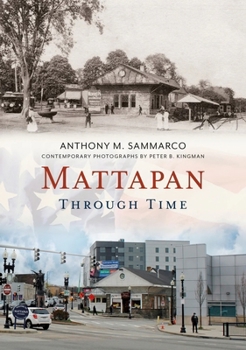Mattapan Through Time
The name Mattapan originated with the Neponset Tribe of the Massachusett Indians, a tribe of the Massachusetts confederation of Native Americans. For well over 200 years, the area remained farms and undeveloped land until the Dorchester and Milton Branch of the Old Conly Railroad established a depot in Mattapan Square which allowed commuting to Boston. By the turn of the twentieth century, Mattapan saw the development of new streets laid out off Blue Hill Avenue and Norfolk Street which slowly become a solid, respectable suburb. Although predominantly Yankee in the late nineteenth century, within a decade or two, the area began to attract new residents with diverse ethnic and religious backgrounds. However, by the twentieth century, Blue Hill Avenue had many Jewish shops "with their Kosher signs and strange wares--pumpernickel bread, rollmops, poppyseed cakes, bagels, odd-looking fish and tripes and wrinkled sausage hanging on long skewers in the butcher shop windows." In Mattapan Through Time, Anthony Sammarco describes Mattapan as having such popular places as the Morton Theatre, the Oriental Theatre, and the Mattapan Theatre as well as Teen Town at Morton Plaza, Chez Vous Rollerway, the G&G Delicatessen, Simco's by the Bridge, Ye Olde Brown Jug, Embers, Blue Hills Restaurant, Brothers Deli, Blackie's Deli-Haus, and the Talbot Bowladrome. Mattapan changed in the late 1960s and 1970s, but it also began to embrace a new middle class, as in the late twentieth century, Haitians, Bahamians, Jamaicans, and others from Caribbean countries began to move to Mattapan and like the residents of a century before, agreed that the location and the ease of transportation were major reasons to invest in the neighborhood. Mattapan, said to be the largest Haitian community in Massachusetts, is today an inclusive neighborhood of people of all walks of life, all races, ethnicities, and religions, and embraces many first-generation immigrants. It is truly the melting pot of Boston with Blue Hill Avenue as its main artery.
Format:Paperback
Language:English
ISBN:1634994515
ISBN13:9781634994514
Release Date:March 2023
Publisher:America Through Time
Length:96 Pages
Weight:0.70 lbs.
Dimensions:0.5" x 6.1" x 10.0"
Customer Reviews
0 rating





